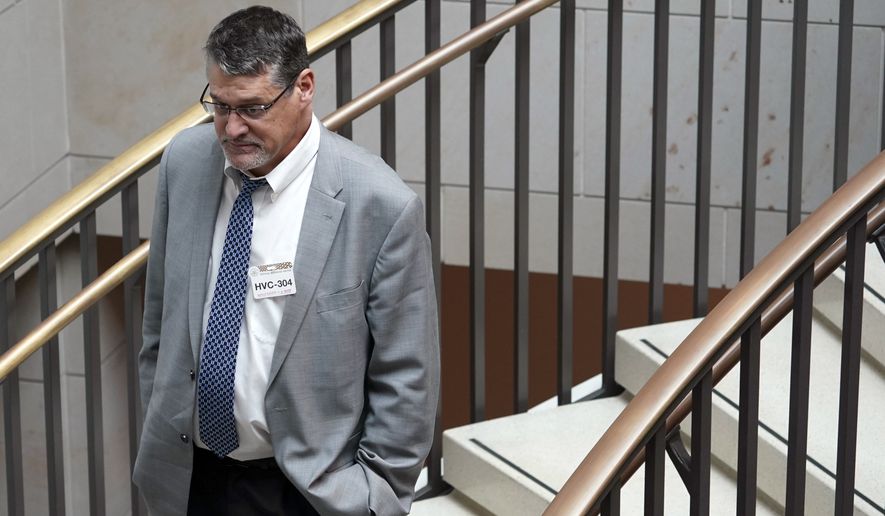Senate Judiciary Committee Chairman Charles Grassley is suggesting Fusion GPS co-founder Glenn Simpson uttered an “outright lie” when he testified to panel staffers.
Mr. Grassley, Iowa Republican, made the charge in a letter to a Democratic senator who wanted Donald Trump Jr. recalled as a witness.
Fusion is one of the key players in the FBI’s nearly two-year Russia investigation. It was Mr. Simpson, a private investigator, who tapped Democratic Party money to hire ex-British spy Christopher Steele, who produced the discredited anti-Trump dossier.
In August 2017, Mr. Simpson testified in private to committee staff. Sen. Dianne Feinstein of California, ranking Democrat, later unilaterally released the transcript.
Mr. Simpson was asked directly if he continued to conduct anti-Trump opposition research after the Nov. 8 election. He answered, “I had no client after the election.”
That answer seems at odds with an FBI interview report, or 302, obtained by the House Permanent Select Committee on Intelligence.
The 302 recounted an interview agents’ conducted with Daniel Jones, a former senior Feinstein staffer who founded his own investigative firm, Penn Quarter Group. Mr. Jones told the agents he had received $50 million from seven to 10 wealthy donors and that he had hired Fusion GPS and Mr. Steele to continue investigating President Trump.
If Mr. Jones’ interview is accurate, it would mean that Fusion did in fact have a post-election client––Penn Quarter Group.
This discrepancy was pointed out by Mr. Grassley in a letter to Sen. Christopher A. Coons, Delaware Democrat.
Mr. Coons wrote to Mr. Grassley asking that Mr. Trump Jr., the president’s son, be recalled as a witness. Mr. Coons said his previous testimony seemed to conflict with a May 19 New York Times article.
As precedent, Mr. Coons cited Mr. Grassley’s criminal referral letter to the Justice Department on Mr. Steele.
That referral, Mr. Grassley said in a letter to Mr. Coons on Tuesday, was based on a discrepancy in official sworn documents, not a newspaper story.
According to an October 2016 affidavit filed by the FBI to obtain a surveillance warrant, Mr. Steele told the bureau that he had not spoken to reporters about his dossier. But in fact, Mr. Steele had briefed a number of reporters in Washington the previous month at Mr. Simpson’s urging, according to a declaration he filed in a London court where he faces a libel charge.
“Where we do have actual evidence of misleading testimony in Committee interviews, we should treat it seriously,” Mr. Grassley said in his letter. “For example, when the Committee staff interviewed Glenn Simpson in August of 2017, Majority staff asked him: ’So you didn’t do any work on the Trump matter after the election date, that was the end of your work?’ Mr. Simpson answered: ’I had no client after the election.’ As we now know, that was extremely misleading, if not an outright lie.”
“Contrary to Mr. Simpson’s denial in the staff interview, according to the FBI and others, Fusion actually did continue Trump dossier work for a new client after the election,” the senator wrote. “As with the circumstances surrounding the Steele referral, we once again have two seemingly contradictory statements in contexts where material lies are criminal.”
Mr. Simpson was not under oath. But Mr. Grassley’s staff explained to him that lying to Congress violates federal law.
Mr. Grassley also took a shot at the New York Times.
“To clarify, the Steele referral was based on contradictory information provided in two sworn statements to courts,” Mr. Grassley said “In contrast, your concern is based on perceived inconsistencies between a Committee interview and a news article. Unfortunately, as we have seen all too frequently, reporting related to the Russia investigation and the Trump campaign has often been inaccurate.”
This is the second hiccup in Mr. Simpson’s testimony.
When Mrs. Feinstein released the transcript in January, it showed that Mr. Simpson testified that Mr. Steele was told by the FBI it had a source inside the Trump campaign.
Shortly after the revelation, sources identified in the news media as close to Fusion GPS said Mr. Steele was actually talking about George Papadopoulos and a conversation he had with an Australian diplomat in London. There was no spy.
But later, Joshua A. Levy, Fusion’s attorney, attested to Mr. Grassley that, in fact, Mr. Simpson’s committee testimony was accurate.
“I am writing in response to your letter, dated January 11, 2018, in which you have asked about the August 22, 2017 testimony from our client Glenn Simpson that Christopher Steele in the fall of 2016 said he believed the FBI had another source within the Trump organization/campaign. Mr. Simpson stands by his testimony,” Mr. Levy said.
Mr. Levy did not return a message seeking comment.
News reports in recent weeks said the FBI procured the services of academic Stefan Halper to spy on Trump associates. He made contact with at least two, Mr. Papadopoulos and volunteer Carter Page.
• Rowan Scarborough can be reached at rscarborough@washingtontimes.com.




Please read our comment policy before commenting.